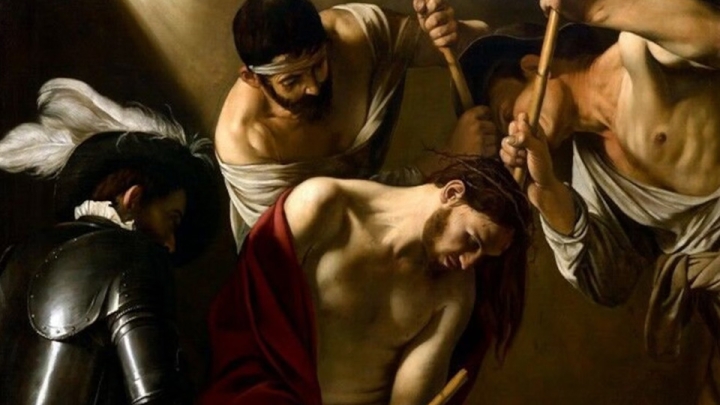But before all the glory of its ultimate success and triumph, this film had its own passion to suffer and overcome at the hands of its enemies. These enemies included powerful Deep State and Deep Synagogue forces, representing the entertainment industry and media, as well as the Deep Church. Not only did the US Catholic Conference of Bishops refuse to support the film, but the USCCB issued this condemnation:
It [the film script] is one of the most troublesome texts, relative to anti-Semitic potential, that any of us had seen in 25 years. It must be emphasized that the main storyline presented Jesus as having been relentlessly pursued by an evil cabal of Jews, headed by the high priest Caiaphas, who finally blackmailed a weak-kneed Pilate into putting Jesus to death. This is precisely the storyline that fueled centuries of anti-Semitism within Christian societies. This is also a storyline rejected by the Roman Catholic Church at Vatican II in its document Nostra aetate, and by nearly all mainline Protestant churches in parallel documents...Unless this basic storyline has been altered by Mr. Gibson, a fringe Catholic who is building his own church in the Los Angeles area and who apparently accepts neither the teachings of Vatican II nor modern biblical scholarship, The Passion of the Christ retains a real potential for undermining the repudiation of classical Christian anti-Semitism by the churches in the last 40 years.
In fact, we are surprised that the Deep Church has not already reformed the Good Friday Passion account by stripping it of any references to the Jewish complicity in the Crucifixion of Christ. Of course, were it to do that, there would be little text or substance left of the account, rendering the Passion insubstantial.
It's shameful that the USCCB opposed The Passion of the Christ. But far worse is that the USCCB is now distancing itself from the Gospel Passion accounts themselves. It has now mandated that the following pastoral note on antisemitism be placed in worship aids and pew missals ahead of Good Friday services:
The passion narratives are proclaimed in full so that all see vividly the love of Christ for each person. In light of this, the crimes during the Passion of Christ cannot be attributed, in either preaching or catechesis, indiscriminately to all Jews of that time, nor to Jews today. The Jewish people should not be referred to as though rejected or cursed, as if this view followed from Scripture. The Church ever keeps in mind that Jesus, his mother Mary, and the apostles all were Jewish. As the Church has always held, Christ freely suffered his passion and death because of the sins of all, that all might be saved.
Truthfully, one can hardly fathom a disclaimer so intrusive to a sacred commemoration or more insulting to the faithful. Imagine if synagogues were required to publicize the following pastoral note at Passover:
The Passover narratives are proclaimed in full so that all see vividly the love of God for each person. In light of this, the crimes during the Exodus events cannot be attributed, in either preaching or catechesis, indiscriminately to all Gentiles of that time, nor to Gentiles today. The Gentile people should not be referred to as though rejected or cursed, as if this view followed from Scripture. The Synagogue ever keeps in mind that Moses was rescued by midwives and the daughter of Pharaoh, who were all Gentiles.
Well, here’s a pastoral note for the USCCB: your suggestion of antisemitism at Good Friday services is debunked by the popular practice of the Gentile faithful adopting the role of the Jewish crowd in reading aloud the Passion in Novus Ordo churches, even to the point of crying out, “Crucify Him! Crucify Him!”
The problem is not antisemitism on the part of Catholic faithful but the cowardness of the US Conference of Catholic Hirelings, who pander to a Deep Synagogue shaming them for the Gospel and Christ Himself. In a recent Last Word article, we demonstrated such pandering by the Deep Church in the matter of the prayer for Jews on Good Friday, which has now been stripped of any mention of Christ and conversion. This most recent pastoral note by the USCCB is yet another manifestation of pandering and cowardness.
In fact, we are surprised that the Deep Church has not already reformed the Good Friday Passion account by stripping it of any references to the Jewish complicity in the Crucifixion of Christ. Of course, were it to do that, there would be little text or substance left of the account, rendering the Passion insubstantial.
But that is precisely what the Deep Church has done in the Sacred Liturgies, namely, it renders not only the Passion but whatever else of Sacred Scripture is shameful for them or contrary to their modernist agenda as insubstantial or even non-existent. Would you like another example related to Sacred Liturgy?
How about Passiontide and more specifically Passion Sunday, both of which have been eliminated in the Novus Ordo liturgical calendar. Could one reason for this be the antisemitic Gospel of Passion Sunday?
At that time, Jesus said to the crowds of the Jews: Which of you can convict Me of sin? If I speak the truth, why do you not believe Me? He who is of God hears the words of God. The reason why you do not hear is that you are not of God. The Jews therefore in answer said to Him, Are we not right in saying that You are a Samaritan, and have a devil? Jesus answered, I have not a devil, but I honor My Father, and you dishonor Me…Jesus said to them, Amen, amen, I say to you, before Abraham came to be, I am. They therefore took up stones to cast at Him; but Jesus hid Himself, and went out from the temple.
The reality is that if the USCCB component of the Deep Church feels a need to mandate a pastoral note regarding antisemitism, then they must include the Evangelists, the Apostles and Jesus Christ Himself. And we assure you of this: the faithful are not antisemitic, but they are rightly anti-USCCB gaslighting!

 jk, I find that info very interesting but it did remind me of something Cliff Clavin would come up with ;)
jk, I find that info very interesting but it did remind me of something Cliff Clavin would come up with ;)